Wellesley Stars – Striving to Achieve Recreational Services
Allison Ijams Sargent writer
Eric Barry photographer
 The agganis arena’s pool area at Boston University is roaring with noise. The Massachusetts Special Olympics is holding a statewide event. Barking announcements are made over a fuzzy loudspeaker. Thousands of voices echo over each other and feedback into a boisterous din. And Julien Gomez is feeling shy. Between the deafening clamor and his natural reserve, the conversation starts slowly. But after some pointed questions from a reporter, his reticence melts away. The eleven-year-old Wellesley resident chats into the mike like a seasoned pro. After all, it concerns a topic he loves: his swim team, the Wellesley STARS. As his father, Rafael Gomez says, “It’s given him a reason to stand up a little prouder and makes him feel like he is really good at something.”
The agganis arena’s pool area at Boston University is roaring with noise. The Massachusetts Special Olympics is holding a statewide event. Barking announcements are made over a fuzzy loudspeaker. Thousands of voices echo over each other and feedback into a boisterous din. And Julien Gomez is feeling shy. Between the deafening clamor and his natural reserve, the conversation starts slowly. But after some pointed questions from a reporter, his reticence melts away. The eleven-year-old Wellesley resident chats into the mike like a seasoned pro. After all, it concerns a topic he loves: his swim team, the Wellesley STARS. As his father, Rafael Gomez says, “It’s given him a reason to stand up a little prouder and makes him feel like he is really good at something.”

STARS athletes attend weekly practices at Regis College in Weston and participate in three major Special Olympics swim meets each spring.
In towns like Wellesley and Weston, town fields are crammed with kids. In MetroWest, children can sign up for a dizzying array of teams and athletic pursuits. But this cornucopia of offerings isn’t available to everyone. What if a child has special needs? “The resources just aren’t there,” says Karen Bernardo, Wellesley resident and stepmother to a daughter with special needs. Fourteen years ago, discouraged about the dearth of athletic services for his twelve-year-old daughter, Karen’s husband and three other friends ignored the obstacles and started their own teams; Wellesley STARS was born.
Even the acronym STARS references the challenges of finding appropriate programming for the area’s special needs population. It stands for Striving To Achieve Recreational Services. The Bernardos’ and their resourceful friends’ do-it-yourself attitude was a godsend for other parents who were searching for appropriate activities for their special needs children. “If it wasn’t for this, there would be a big hole in these kids’ lives,” says Wellesley resident Curtis Moore whose son Max has swum for the STARS team for three years. During the first years, STARS was primarily a basketball team, but soon after morphed into a swim team. Karen Bernardo was the first coach. “We had four kids sign up, then six, then eight,” says Bernardo. “We are now up to 25 swimmers every week.” Recognizing that this swim program was unique in the area, this Wellesley-based team accepts swimmers from surrounding towns. Bernardo is now entering her 15th year heading up the swim program and is an inductee in the Massachusetts Special Olympics Hall of Fame. She is extraordinarily proud of her swimmers.
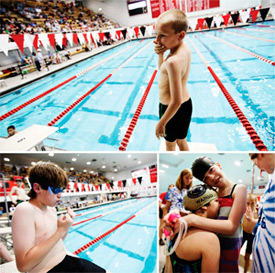
Wellesley STARS athletes at the Massachusetts Special Olympics State Games held at Harvard University in June.
“Over the years, I have had two athletes attend the World Games,” she says, “and I have had seven kids go to Nationals.” But it is not necessarily the superlative swimmers who are most worthy of her praise. It is the small micro-steps that her athletes achieve that contribute to their burgeoning sense of confidence and where she sees the most critical growth. “The pool is a place where they can succeed,” says Bernardo. “It’s not all about the medal; it’s about doing their very best.”
Parents of STARS swimmers are quick to point to the challenge of “personal best” as being of particular importance to their children. “The coaches are keeping their times and always making sure that they are improving,” says Moore. “Not to win but to do the best they can.” This ongoing expectation of perseverance is a hallmark of Wellesley STARS. Maureen Huddleston of Wellesley has two children on the team. “At my son’s first meet, he got gold medal after gold medal,” she notes, “but then at one point, he just got a ribbon. He had to deal with that.” Athletes practice once a week from January to June and compete in three major events every spring. Because these meets involve genuine competition, athletes learn hard lessons about loss and disappointment. But this reality check serves them well. Says Moore: “They’re not going to be cute forever; they’re not going to be small forever. You want to put them in an environment where there are expectations they have to meet and if they don’t, they know the difference.”
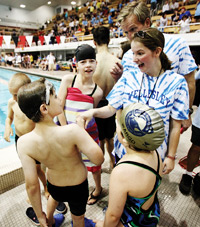
Prizes ranging from ribbons to gold medals are awarded to all finishing athletes.
At their heart, team sports have always been about two things: building trust and building relationships. Wellesley STARS’ gift to its participants is the strengthening of these intangibles. “STARS levels the playing field,” says Maureen Callahan, mother of a twelve-year-old swimmer. “It makes them think ‘I am part of a team.’” Most of the athletes on STARS have siblings who are constantly being ferried to various fields for their sporting events. STARS is something the athletes can claim as their own. But there is another obvious factor that connects these kids to their team. It’s fun. “Swimming is my favorite sport,” says Max Moore. “It makes me feel fast.” Both Max and Julien Gomez talk more about their friends on the team than the actual swimming. “I like to see my friends,” says Julien simply.
Observing STARS swim practice at Regis College is like watching a big, noisy machine. The swimmers slice through the water at varying speeds. Clumps of athletes fiddle around in groups waiting for further instruction from coaches who constantly cruise up and down poolside shouting encouragement. A fair amount of illicit splashing is taking place. Someone in the corner is learning to dive. Swimming literally immerses the athletes in a different element. The repetitive nature of doing laps can have a meditative quality that is soothing. “Swimming physically makes my son feel good,” says parent Maureen Callahan. “It gives him a ton of sensory input.” Another parent, Marla Lucas agrees: “My son has a lot of sensory issues and being in the water calms him down.”
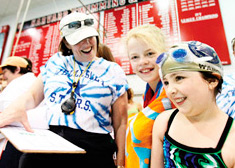
Coach Karen Bernardo with STARS swimmers at the Massachusetts Special Olympics meet held at Harvard University.
What else is palpable at practice is the feeling of kinship between the swimmers and their coaches. “Most of the coaches do not have kids on the team,” says Marla Lucas with admiration. Indeed the very high ratio of athletes to coaches underscores the ability of STARS to attract volunteers. “I have coaches coming out of my ears,” laughs Karen Bernardo. The chance to work with this population of swimmers takes a certain kind of coach. Many have relatives or friends who have special needs. The rewards of the coach/athlete relationship can pop up unexpectedly. “I remember coaching a sensitive boy who came in first in his event at our meet in Connecticut. I was so happy and telling him what a great job he did. Feeling a little bad for the kids who came in behind him, he quickly said to me, ‘We’re all winners here. The important part is that we have fun and support each other,’” recalls coach and Weston resident Maureen McCaffrey. “I found myself wondering which one of us was the teacher.”
In the pool, swimmers continue to refine their technique. Some work on stroke development, others on stamina. One coach is literally standing behind a swimmer holding his arms and pinwheeling them through the air in a mock freestyle. Another coach walks slowly up and down the pool in order to closely observe and comment on her swimmers. Some are in the pool one-on-one with their athletes, shadowing them in the water to let them know they aren’t alone. But other coaches stand back a little and let their swimmers go on ahead with the knowledge that they are right there on the sidelines ready and waiting should they ever need them. ![]()
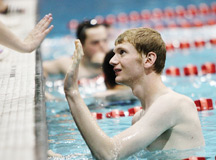
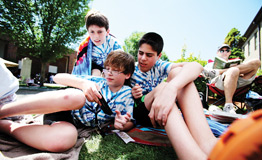
© 2010 Elm Bank Media | Beth Furman, Publisher | Beth@ElmBankMedia.com


recent comments